#Three major inspirations for this story include:
Explore tagged Tumblr posts
Text
I haven't done much writing all year (sorry if you're a follower of my webnovels, I promise I'll try to finish those... eventually), but over the past couple months I've been very slowly working on an extremely self-indulgent short story, which I may or may not ever share anywhere in its entirety, but I'm really happy with the opening paragraph so I've decided I want to post it around. So, after entirely too much to-do, here it is: I emerged from the garden on the eighth day, an accident of creation, and I will live only until the floodwaters come to drown all those who have no pair; for I have learned it is wickedness to be yourself alone.
#is this story kind of self-insert fanfiction of the book of genesis? yes#but is it also kind of an id/ego/superego allegory where the id is the main character and the biblical serpent is the superego? also yes#I bet you'll never guess who the ego would be in that reading (it's Eve)#Three major inspirations for this story include:#my own ankle tattoo of a harpy#the song sparrow by Big Thief#and the song Supergenesis by the Mountain Goats and Kaki King#it is one of the most bafflingly idiosyncratic stories I've ever written#and I'm having fun with it
4 notes
·
View notes
Text
"In 2021, scientists in Guelph, Ontario set out to accomplish something that had never been done before: open a lab specifically designed for raising bumble bees in captivity.
Now, three years later, the scientists at the Bumble Bee Conservation Lab are celebrating a huge milestone. Over the course of 2024, they successfully pulled off what was once deemed impossible and raised a generation of yellow-banded bumble bees.
The Bumble Bee Conservation Lab, which operates under the nonprofit Wildlife Preservation Canada, is the culmination of a decade-long mission to save the bee species, which is listed as endangered under the Xerces Society for Invertebrate Conservation...
Although the efforts have been in motion for over a decade, the lab itself is a recent development that has rapidly accelerated conservation efforts.
For bee scientists, the urgency was necessary.
“We could see the major declines happening rapidly in Canada’s native bumble bees and knew we had to act, not just talk about the problem, but do something practical and immediate,” Woolaver said.
Yellow-banded bumble bees, which live in southern Canada and across a huge swatch of the United States, were once a common species.

However, like many other bee species, their populations declined sharply in the mid-1990s from a litany of threats, including pathogens, pesticides, and dramatic habitat loss.
Since the turn of the century, scientists have plunged in to give bees a helping hand. But it was only in the last decade that Woolaver and his team “identified a major gap” in bumble bee conservation and set out to solve it.
“No one knew how to breed threatened species in captivity,” he explained. “This is critically important if assurance populations are needed to keep a species from going extinct and to assist with future reintroductions.”
To start their experiment, scientists hand-selected wild queen bees throughout Ontario and brought them to the temperature-controlled lab, where they were “treated like queens” and fed tiny balls of nectar and pollen.
Then, with the help of Ontario’s African Lion Safari theme park, the queens were brought out to small, outdoor enclosures and paired with other bees with the hope that mating would occur.
For some pairs, they had to play around with different environments to “set the mood,” swapping out spacious flight cages for cozier colony boxes.
And it worked.
“The two biggest success stories of 2024 were that we successfully bred our focal species, yellow-banded bumble bees, through their entire lifecycle for the first time,” Woolaver said.
“[And] the first successful overwintering of yellow-banded bumble bees last winter allowed us to establish our first lab generation, doubling our mating successes and significantly increasing the number of young queens for overwintering to wake early spring and start their own colonies for future generations and future reintroductions.”
Although the first-of-its-kind experiment required careful planning, consideration, resources, and a decade of research, Woolaver hopes that their efforts inspire others to help bees in backyards across North America.
“Be aware that our native bumble bees really are in serious decline,” Woolaver noted, “so when cottagers see bumble bees pollinating plants in their gardens, they really are seeing something special.”"
-via GoodGoodGood, December 9, 2024
#bees#insect#save the bees#xerces society#biodiversity#conservation#endangered species#wildlife conservation#canada#north america#climate action#climate news#good news#hope
7K notes
·
View notes
Text
David Bowie - Space Oddity 1969
"Space Oddity" is a song by the English singer-songwriter David Bowie. It was first released on 11 July 1969 as a 7-inch single, then as the opening track of his second studio album, David Bowie. It is a tale about a fictional astronaut named Major Tom; its title and subject matter were partly inspired by 2001: A Space Odyssey (1968) and Bowie's feelings of alienation at that point in his career. Its sound departed from the music hall of his debut album to psychedelic folk inspired by the Bee Gees; it was one of the most musically complex compositions he had written up to that point. "Space Oddity" is considered one of Bowie's finest recordings and remains one of his most popular songs. It has appeared in numerous "best-of" lists, including the Rock and Roll Hall of Fame's "500 Songs that Shaped Rock and Roll". It was inducted into the Grammy Hall of Fame in 2018.
The label rush-released the single to capitalise on the Apollo 11 Moon mission, which was launched five days later. According to Bowie: "It was picked up by British television and used as the background music for the landing itself in Britain … Though I'm sure they really weren't listening to the lyric at all; it wasn't a pleasant thing to juxtapose against a moon landing. Of course, I was overjoyed that they did." Upon realising the dark lyrics, the BBC ceased playing it until the Apollo 11 crew safely returned home. It initially sold poorly but soon reached number five in the UK, becoming Bowie's first and only chart hit for another three years. Reissues became Bowie's first US hit in 1972, and his first UK number one in 1975. Bowie revisited the Major Tom character in later singles, notably the sequel song "Ashes to Ashes" (1980).
A range of artists have covered "Space Oddity" and others have released songs that reference Major Tom or develop the story of "Space Oddity". In May 2013, the Canadian astronaut and artist Chris Hadfield, commander of Expedition 35 to the International Space Station (ISS), recorded a video of "Space Oddity" while stationed on the ISS that went viral and generated media coverage. It was the first music video to be recorded in space. In the video, filmed towards the end of Hadfield's time on the ISS, Hadfield sang and played guitar while floating around the space station. On Earth, Joe Corcoran produced and mixed the backing track with a piano arrangement by the multi-instrumentalist Emm Gryner, who worked with Bowie during his 1999–2000 concert tours. The lyrics were somewhat altered; rather than losing communication with Ground Control and being lost in space as a result, Major Tom receives his orders to land and does so safely, reflecting Hadfield's imminent return from his final mission to the ISS. The song also mentions the Soyuz spacecraft that Hadfield travelled in. Hadfield announced the video on his Twitter account: "With deference to the genius of David Bowie, here's Space Oddity, recorded on Station. A last glimpse of the World." Bowie's social media team responded to the video, tweeting back to Hadfield, "Hallo Spaceboy …", and later called the cover "possibly the most poignant version of the song ever created".
Hadfield's performance was the subject of a piece by Glenn Fleishman in The Economist on 22 May 2013 analyzing the legal implications of publicly performing a copyrighted work of music while in Earth orbit. "Space Oddity" is the only song of Bowie's for which he did not own the copyright; his publisher granted Hadfield a one-year licence to the song. When the one-year licence expired on 13 May 2014, the official video was taken offline despite Bowie's explicit wishes for the publisher to grant Hadfield a licence at no charge to record the song and produce the video. Following negotiations, the video was restored to Youtube on 2 November 2014 with a two-year licence agreement.
"Space Oddity" received a total of 86,5% yes votes! Previous David Bowie polls: #33 "I'm Afraid of Americans", #235 "Life on Mars?" (and original artist of #118 "The Man Who Sold the World")
youtube
#dylts#dylts poll#finished#high yes#low no#60s#o1#o1 sweep#o1 ultrasweep#o234#lo23#lo24#lo24 tie#lo34#lo2#lo4#david bowie#english
469 notes
·
View notes
Text
Writing Notes: Nuanced Character Relationships

Fiction readers and film audiences revel in observing how two or more characters’ relationships wax and wane. By building deep, believable character relationships, you will satisfy one of the most important tenets for creating a good story.
Tips for Building Relationships Between Your Characters
The art of writing great relationships for your main character and supporting characters takes time and practice. Here are some creative writing tips to help you shape satisfying fictional relationships over the course of a story:
Draw on your own life experience. It’s a bit of a cliché to say that novelists and screenwriters should write what they know, but when it comes to character interactions, this rule looms large. Most writers have experienced many types of relationships by the time they sit down to write their first novel or screenplay. They understand how different relationships work. The bond between best friends differs from the relationship between family members or couples in romantic relationships. Draw inspiration from your own relationships—which could involve anything from high school crushes to recent external conflict with co-workers—and incorporate them into the fictional relationships in your writing.
Create a relationship arc. Static characters produce static storylines. Just as your main plot needs an arc from beginning to end, so do the relationships between your characters. Readers respond to dynamic characters who change over the course of a story. (Examples of dynamic main characters include Shakespeare’s Hamlet and Charles Dickens’ Ebenezer Scrooge.) When a dynamic character changes, their relationships with the different characters in the story also change. If you load your novel or screenplay with dynamic characters, you’ll find all sorts of occasions for both internal change and interpersonal arcs.
Let outward character behavior come from a detailed inner life. A good character is written with a robust inner life, which then informs the way they behave in the world. External conflict with another character almost always begins with internal conflict. Even characters in dire interpersonal circumstances, like Katniss in Suzanne Collins’ The Hunger Games, draw as much motivation from their internal selves as they do from the character dynamics of those who surround them. Make sure that as an author, you have a grasp of the inner lives of your major and minor characters alike.
Give your characters unique traits. Most people’s favorite character relationships don’t involve stock characters who can be easily categorized as tropes. In Jane Austen’s classic Pride and Prejudice, Mr. Darcy is the love interest, but he doesn’t read at all like a stock romantic lead. And yet because he, like the protagonist Elizabeth Bennett, is written as a strong character capable of change, he is able to evolve into Elizabeth’s true love.
Place your characters in multiple relationships. Three-dimensional characters should have many things going on simultaneously. It’s your job as an author to make sure your characters are involved in different relationships in different stages. Even a short story has space for its protagonist to be in a great place with one person (such as their husband) but in a terrible bind elsewhere (such as with a coworker). As the character changes, the state of those relationships may reverse, and such reversals are what keep a storyline interesting.
Let subtext carry the load. In real life, people aren’t always explicit about their true feelings and points of view. Nor do they call each other by name every time they speak. They may not even speak in full sentences, preferring to let subtext fill in the gaps. As an author or screenwriter, you must transfer this real-life behavior onto the page. Real relationships involve subtlety, and as you gain experience as a writer, you’ll be better able to rely on subtext to explain key information without being overly explicit or didactic.
Make a strategic narration choice. First-person narrators understand their own inner lives quite well, but they may have limited information about the other characters they interact with. This can produce fascinating relationship dynamics among your characters, but it can also slow down your storytelling. If you’re having a hard time with the limitations of a first-person narrator, switch to third-person narration; you’ll have a lot more omniscient information about your characters and what they really think of one another.
Source ⚜ More: Notes & References ⚜ Writing Resources PDFs
#character development#writeblr#literature#writers on tumblr#writing reference#dark academia#spilled ink#writing prompt#creative writing#writing advice#on writing#writing inspiration#writing ideas#light academia#lit#writing resources
163 notes
·
View notes
Text
DEMO UPDATE AND PROGRESS REPORT:
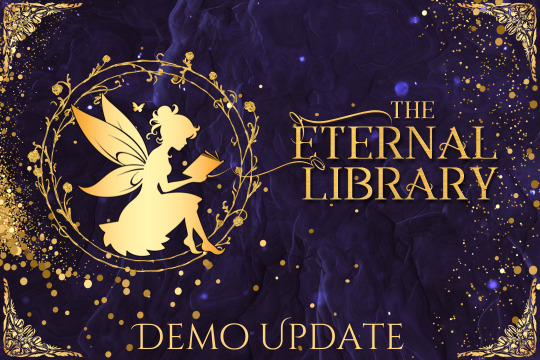
Can you believe it’s already the end of January? As promised, the public demo of The Eternal Library has been updated to include all of chapter three (now over 65,000 words).
I’m nearly finished with the first draft of chapter four, which will go out to Patreon subscribers for early access once I’ve had a chance to do a read-through and polish it up a bit. I’m hoping to have that ready in a week or so.
I’ve been feeling the ebb and flow of energy this month. As we get into the deep winter up here in Canada, my body craves extra sleep. My days are full and my family is my priority, so some days I have time for writing and other days I do not. I have to give myself permission to rest, recharge, and get outside for walks with my dog. Down time helps provide the kind of inspiration and endurance it takes to write a project like this.
My guess is chapter four will be around 25k words (currently 23k). That would take the WIP to 90,000 words, and I feel like I’ve barely started telling the story. It’s possible this might be my longest IF novel yet. Their Majesties’ Pleasure is over 225k words and Ink and Intrigue is over 350k.
I started working on this project less than four months ago and the WIP is already nearing 90k words. I’m pretty impressed with that! As the story and variables get more complicated progress may be a bit slower, but I’ll keep marching steadily onward.
A week or so ago it occurred to me that I’m going to have to write two versions of chapter five. There will be a major branch split at the end of chapter four, offering one adventure or another before the storyline comes back together in chapter six. I’m both excited and apprehensive about how much work it will involve, but I’m quite sure it will be worth it!
Play the demo of The Eternal Library for free!

#interactive fiction#fantasy#romance#fae#hosted games#choice of games#interactive novel#the eternal library#demo update
238 notes
·
View notes
Text
Buy Story and Art Bundles to Raise Money for Rainbow Railroad!

HAPPY PRIDE! For the third year running, Duck Prints Press is celebrating with all-new bundles to benefit charity. This year, bundles include 31 short stories and 8 artworks across three bundles – an art bundle, a general imprint bundle, and an explicit imprint bundle! Over the past 2 years, with your help we’ve been able to donate over $500 to three different charities; this year, we’re back and we hope you’ll join us again! This year, charitable proceeds will go (once again) to Rainbow Railroad. We’re also offering bundles both on our website and on itch.io!
Already convinced and ready to buy? Here are the links right up top for your convenience!
ART BUNDLE – duckprintspress.com | itch.io
GENERAL IMPRINT BUNDLE – duckprintspress.com | itch.io
EXPLICIT IMPRINT BUNDLE – duckprintspress.com | itch.io
Want to know more first? Read on…
How This Works
you buy one or both bundles between now and June 30th, 2025.
we tally up all the proceeds earned and do some math-e-magic to figure out how much we’re donating!
before the end of July, we donate the raised money to Rainbow Railroad, we post the proof we’ve done so.
you get fantastic stories!
we all get that happy, glowy feeling of knowing that money has been well-spent on fantastic causes!
About the Press
Duck Prints Press is a queer-owned indie press founded to publish original works by fancreators. We’ve been in operation for almost 4.5 years, and in that time we’ve worked with well over 150 creators to publish eight anthologies and almost 150 other stories, from shorts to novels, as well as three substantial art projects (with a fourth, pride-inspired project launching in just a couple weeks!) – and we’ve got more on the works. The vast majority of our creators and their creations are queer/LGTBQIA+.
26 authors and 8 artists have chosen to include their works this year’s bundles. Bundle contributors voted, and we’ve decided to support again the same charity we supported last year – Rainbow Railroad.
About Rainbow Railroad
In countries around the world, LGBTQI+ people face violence and oppression simply because of who they love or who they are. Rainbow Railroad helps them get to safety! Rainbow Railroad is a global not-for-profit organization that helps at-risk LGBTQI+ people get to safety worldwide. Based in the United States and Canada, they’re an organization that helps LGBTQI+ people facing persecution based on their sexual orientation, gender identity and sex characteristics. In a time when there are more displaced people than ever, LGBTQI+ people are uniquely vulnerable due to systemic, state-enabled homophobia and transphobia. These factors either displace them in their own country or prevent them from escaping harm.
Note: This charity is not affiliated with the Press and have not endorsed this in any way! Text is from the Rainbow Railroad website.
About the Bundles
General Imprint Bundle
16 stories! 222 pages/69,029 words. Price: $21.50 USD. Approximately half of the sales price for the General Imprint Bundle will be donated to Rainbow Railroad!
Princess Antonia del Montari, aka the Accidental Barista by A. L. Heard
The Problem with Wishes by Annabeth Lynch
So Much Braver by boneturtle
Unsafe Haven by Cedar D. McCafferty-Svec
Got You Covered by D. V. Morse
Troubled Trouble by Genevieve Maxwell
Ride On, Shooting Star by J. D. Harlock
A Thousand Hopes, A Thousand Risks by Kelas Lloyd
The Ending Line of Casablanca by Lucy K. R.
Going Dark by Max Jason Peterson
The Waiting Wife by Mikki Madison
The Deadman’s Gambit by Nicola Kapron
The Inscrutable Fate of the ISV Devotion by S. J. Ralston
Best Friends AND… by Tris Lawrence
In Fine Feather by Violet J. Hayes
The Lighthouse and the Sea by Zel Howland
Visit the bundle page to learn more about these stories.
Explicit Imprint Bundle
15 stories! 248 pages/86,593 words. Price: $24.00 USD. Approximately half of the sales price of the Explicit Imprint Bundle will be donated to Rainbow Railroad!
A Blessing Shared by A. L. Heard
Running Mates by boneturtle
sweet static by Cedar D. McCafferty-Svec
The Benefits of Consequences by Dei Walker
In the Moonlight by E. V. Dean
then, too, at sea by ilgaksu
What Monsters Need by Lyn Weaver
Hold My Reins by Lyonel Loy
The Fated Prince by Mikki Madison
Lust by Nina Waters
Tough Job, Sweet Reward by Samantha M. Piper
Escape by Sanne Burg
Dancing for the King by Terra P. Waters
Just Let Me Lose Control by Tris Lawrence
This Treatment for Chronic Pain has an Unbelievable Side Effect! by Xianyu Zhou
Visit the bundle page to learn more about these stories.
Art Bundle
8 artworks! Price: $12.75. Approximately a quarter of the sales price of the Art Bundle will be donated to Rainbow Railroad!
Ol’ Reliable by Aaron Kotze
Samhain by Aceriee
I want to be different. by Jagoda Zirebiec
Spark by May Barros
Snow Heart by Max Jason Peterson
april’s sweet showers by radicalhoodie
untitled (Mermaids) by swev.art
Chrysopoeia by Zel Howland
Visit the bundle page to learn more about this art.
#duck prints press#pride#pride 2025#this probably needs a million other tags but i'm so outta time today#aaaaaa
100 notes
·
View notes
Text
LADS and Claymores
Inspired by the lovely @heartswithinreach and her amazing imagines. I haven't posted anything on tumblr for YEARS, but I love the boys so much I decided to give it another go!
Inspired by the fact that I am, for the first time in my twenty three years of life, a heavy weapon main in this game. Minor spoilers for some of the main story and yes, no Sylus. I'm trying to be a good girl and not skip ahead so I haven't met him yet :(

Zayne is concerned. Throwing all that weight around everyday applies serious stress on your body, and he wants to make sure you’re taking care of yourself. Are you consuming enough protein, carbs, and water to aid in your muscle recovery? What about your sleep schedule? You are making sure to stretch before and after work, right? You always feel a little dizzy whenever you have dinner together, trying to keep up with his rapid fire questions.
On a softer note, he always offers a massage whenever you come home with him. His evol leaves his hands blessedly cool as he rubs soothing circles in your knots. By the time he finishes, you’re a boneless, half-asleep heap on his bed. They also make up for the foul smelling horse pills he expects you to take with a full glass of cherry juice in the morning.
During combat, he stays clear. He knows his strengths, and they don’t include trying to keep up with your great-sword swinging self. He can, however, freeze the feet of your targets which gives you ample time to wind up a decisive, fatal blow. And… you do look lovely under a shower of ice and Metaflux.
Rafayel is upset. It’s hard to be your knight in shining armor when you’re swinging around a sword as tall as he is! Not that he wants you to be a damsel in distress anymore or anything, but a part of him misses the way you once needed him to come to your rescue. Plus, his flames and dagger are just a piss-poor combo when it comes to your team ups. You spend more energy making sure you don’t end up cleaving your favorite artist in two than you do fighting Wanderers.
Now, outside of fights, it’s a bit of a different story. If you can handle the weight of a claymore then surely holding him in your lap for hours on end is nothing in comparison, right? Oh, and he needs help moving a second wardrobe into his bedroom, you don’t mind do you? While you’re at it, Thomas is having a new frame delivered for his newest portrait so could you please bring that in with you?
You roll your eyes at the majority of his requests, but he always looks so genuinely put out whenever he sees you materialize your sword for combat that you don’t have the heart to say no.
Xavier is confused. What’s wrong with a normal sword, why do you need one that’s almost as big as he is? You honestly don’t have an answer for him outside of “I like the way it feels” and “it’s hard to be scared shitless when you’ve got a big ass sword”.
Really, watching you swing that thing around makes him feel tired. More so than usual he means. You’re not built for prolonged combat, so you go into every fight ready to put down the threat as quickly as humanly possible. He dutifully marches in after you, cleaning up the Wanderers lucky enough to escape your initial slaughter.
It does make it weird for him whenever you ask him to open jars or help lift heavy boxes outside of work, though. Do you really need his help opening this pickle jar or are you just feeling lazy and don’t want to apply the effort? Your silence is telling.
BONUS:
Caleb thinks you’re kidding. He laughs when you tell him that you chose to specialize in two-handed weapons, and then he sees your Hunter’s application. What follows is the most bizarre fight the two of you have ever had.
He asks you if you hit your head on the way to register or if you’re just stupid which immediately puts you on the defensive. When you deny both these things, he proceeds to lecture you on the long term consequences of muscle damage as if that’s the biggest thing you’ll have to worry about when you’re going to be out hunting literal aliens. Surprise, surprise, that makes him even more mad.
In the end, the truth comes: he hates that you’re becoming a Deepspace Hunter. It’s a surprising show of vulnerability that makes your chest go tight and your knees weak. You toe the ground, suddenly too shy to look up at his face, and mumble something about switching over to mid-range pistols before hightailing it out of his room. You don’t, of course, you forget somewhere in the two minutes it takes to wrench open your bedroom door and dive under the covers. The look on his face when he sees you going through some exercises while back home from basic almost, just almost, makes it worth it.
#love and deepspace#zayne love and deepspace#rafayel love and deepspace#xavier love and deepspace#caleb love and deepspace#imagines#x reader#lads x reader#zayne x reader#rafayel x reader#xavier x reader#caleb x reader
232 notes
·
View notes
Text

The Ink Didn’t Fade
Phainon’s Version: My Dearest Pairing: Phainon x AFAB!Reader Word Count: 11.1k (overall fic including other parts)
Part 1, Part 2
Summary: He held the line. He made the shot. He remembered the smell of your burnt bacon while bleeding out.
A casket. A letter. A love that survived the war—he just didn’t.
Phainon died a soldier. But he loved you like a man.
And the ink didn’t fade.
C.w: Major character death, war themes, graphic violence, implied ptsd, survivor's guilt, tragedy, hallucinations, violence, blood, grief, separation anxiety
A/n: wtf, genuinely wtf, NO BETA READ. If something is misspelled pretend it doesn’t exist to save me from embarrassment. AAAAAAAA. THIS IS LONG and I hope I gave the characters justice. I’m not the best writer when it comes to war topics but I’ve read some WW2 and WW1 stories and even ones from the Vietnam War. This story isn’t EXACTLY set in those irl wars themselves, but it takes some inspiration and idk bro
taglist: @reapersan @strawb3rri-bliss @sugilitez @aerisevx

“Lieutenant Phainon! A letter was sent to you,” yelled one of his men, ducking beneath the tangle of barbed wire that carved the trench in half. His voice barely rose above the murmur of boots in mud and the low thunder of distant artillery.
Phainon didn’t react at first. His gloves were soaked through, fingertips numb as he scraped dried blood from his blade, an old habit, a quiet ritual. He’d stopped expecting anything weeks ago. Months, maybe. Time didn’t move here; it collapsed. Still, he turned.
The soldier handed it over like it was something sacred. "Courier dropped it five minutes ago. Name’s yours. Looks like it came from way back."
Phainon stared. The envelope was smudged and weather-worn, but there it was — your handwriting. It was slanted, soft, pressed like you were trying not to tear the page. He’d have known it anywhere.
When Phainon was first drafted into the front lines, his boots were too clean, and he still said things like “when I get back” instead of “if.” He wore his sword even when people called it impractical. “Ceremonial,” someone had joked. But to Phainon, it wasn’t. It was memory. Commissioned by a close friend. Something from back home. A weight he chose to carry.
Back then, your letters came every week. Sometimes twice. They smelled faintly of lavender or ink or sun— whatever your room smelled like when you wrote them. You always said the same thing in a dozen different ways: I believe you’ll survive this. I believe you’ll come home to me- hopefully without a torn off limb.
Now he clutched the paper like a lifeline, unsure if it was even real. The last letter he’d gotten was dated nearly three months ago. That one had said you’d been transferred — mail services, inland, but closer than before. He’d written back immediately. He wrote again after that. And again.
No reply came. The intercom system went down a week later, and when it came back up, he asked every passing unit, every damn logistics officer—any word from the city? Any mail backlogged? Anything from the woman who writes in blue ink and seals her letters with tape and hope and a sprinkle of cinnamon from your desserts?
Nothing.
He’d started to wonder if you’d stopped writing. If you'd heard what happened at the river. If someone told you he hadn’t made it. If you moved on.
But here it was. Paper and ink and fingerprints. You hadn’t stopped. You hadn’t given up.
He stared a moment longer before carefully removing the wax seal, rereading your name, thumbing over the corner of the postcard, it smelled faintly of cinnamon again. Maybe a hint of vanilla too.
He pressed the letter against his chest for a second—just a second—then unfolded it like it might crumble in his hands. The paper, creased and worn, trembled in the cold. His breath fogged over the ink as he began to read it.
"My dearest, Phainon, I heard from the intercom that letters sent to your troop have been lost after an invasion. I’m sorry— I don’t know if this will reach you. I don’t even know if you’re alive. But I write anyway. It’s all I can do."
Phainon paused, thumb tracing the edge of the paper like he could feel your pulse through it.
"It’s been three months of silence. I wake up to birdsong and the wailing of the wounded. A boy, seventeen, maybe, screamed for his mother while Cassandra cut what was left of his leg. I couldn’t look away. Couldn’t breathe. War doesn’t care about age, or kindness, or whether someone was once good."
He reread that part. Slowly. Then again. His knuckles whitened against the letter.
"Sometimes, I think of you when I pour water into the tea kettle. When I see handwriting that almost looks like yours. When I taste cinnamon on bread and remember how you hated bitter things. I leave a space for your letters on my cot. Just in case."
A breath hitched in his throat. He blinked hard. The mud on his boots felt heavier than usual.
"I hope you haven’t lost a limb yet. I hope you haven’t lost yourself. Sometimes I pray—not to the titan gods, just to anything that might listen—that they spare people like you. Like us. I still believe you’ll come home to me."
The bottom of the letter was smudged, maybe rain, maybe tears. Your name, barely legible.
Phainon folded it back carefully. He didn’t tuck it away. Just held it, like it was something breathing.
He didn’t speak for a long time.
Then, quietly, to no one in particular:
“I’ll come home. Don’t forget me.”
And somewhere in the haze of smoke and gunmetal sky, he let himself believe it. Even just for a moment.
A bark rang out in the distance—the brown mutt with the tiny tail they’d half-adopted near the mess tent, chasing something through the slush. Boots scuffed past the trench, a few soldiers muttering as they reloaded, the sharp click of magazines sliding into place echoing down the line.
Phainon stayed kneeling, the letter still in hand, barely noticing when Theodore ducked into the trench beside him.
“Sir?” Theodore asked, softer than usual. “Mail from the gods, huh?”
Phainon didn’t look up right away. Just gave a slight nod, a tired smile playing at the edge of his lips.
Theodore sat next to him, uninvited but familiar. He smelled faintly of gunpowder and cheap cigarettes, it ewas the kind all the younger ones passed around. Phainon never touched the stuff, but the scent was always there, woven into the trench walls like rot and rust.
“Someone back home still praying for your pretty face,” Theo added with a grin, nudging his elbow lightly. “Probably the same one that color-coded your damn bedsheets.”
Phainon gave a short, dry laugh in just one breath. “She always put blue on Mondays. Said it was calming.”
“Did it work?”
“Maybe.”
They sat there for a beat. Somewhere up the hill, a shell thudded against the earth. Distant, but not distant enough.
Theodore pulled out Phainon’s blade from where it leaned against the wooden support beam and began polishing it without asking, as he always did when things got quiet.
“You know,” Theo said after a while, “I think the dog’s getting fatter. One of the new medics sneaks him bread.”
“He’ll outlive us all,” Phainon murmured.
“Damn right,” Theodore grinned. “He doesn’t even flinch at the mortars anymore. Braver than half the unit.”
Phainon let his gaze drift upward, past the broken sky, past the curling smoke. He thought of sunflowers. The smell of cinnamon bread. Blue sheets on Mondays.
“I’ll write back,” he said.
Theodore raised a brow. “You haven’t written in weeks.”
“I’ll write tonight,” Phainon repeated, a bit firmer this time. “She waited. So I will too.”
Theodore nodded once, satisfied. “Good. Because if you die without writing her back, I’ll find your ghost and beat your ass.”
That earned a real laugh. Quiet, rough, but real.
After dinner—stale bread, watered-down soup, and the bitter crunch of burnt onions— Phainon sat back on his cot, legs spread, boots still muddy. He didn’t take off his coat. The chill had crept in early tonight, and it clung to everything: the canvas walls, the tips of his fingers, the corners of his mouth.
But his hands weren’t shaking anymore.
The letter sat folded in his inner pocket, right against his heartbeat. He touched it again and again, not pulling it out this time. Just… feeling it there. Proof. Not just of you, but of who he still was around you. That version of him. The gentler one.
He let himself think about your smile. Not the one in memories, or photographs, or old dreams softened by time. The real one — or the one he imagined you might’ve worn as you wrote. Lips curved slightly. Ink-stained thumb. Brows furrowed in thought.
His heart ached in a way that wasn’t pain.
“Lieutenant.”
He looked up. One of the younger soldiers, Merek, maybe seventeen, eyes too wide, stood by the tent flap.
“Yes?”
“It’s Charis, sir. He’s not doing too well. Thought you’d want to know.”
Phainon stood immediately. “Where is he?”
“Mess tent. Hasn’t moved since lunch.”
By the time he arrived, Charis was sitting in the corner, back hunched, arms wrapped around himself like armor. A letter lay open on the table, already damp at the edges. No food in front of him. Just a tin cup, still full. Cold.
Phainon approached slowly. “Charis.”
The man looked up. Late thirties. Gruff. Usually the one cracking jokes about how he'd name his rifle after his wife just to remember how to hold her.
Now he looked like a man cracked clean down the center.
“It was my boy,” he said hoarsely. “Myles.”
Phainon didn’t speak. Just waited.
“Died two months ago. Malaria. I—I didn’t even know he was sick.” He let out a shaking breath. “They buried him already. Said he asked for me before he passed. Said he kept asking if I was gonna send more stories.”
The mess tent buzzed distantly, the men scraping plates, a pan clattering, a few laughs from the corner. But here, in this corner, it felt like a tomb.
“I’m sorry,” Phainon said quietly.
Charis rubbed at his face roughly. “Feels like I’m mourning at the wrong time. Like the grief is stale. Secondhand. I didn’t even get to hold him.”
“You don’t have to rush it,” Phainon murmured. “Time’s a mess here anyway.”
They sat in silence for a while. Then Charis added, “We have to plant tripwires tomorrow, don’t we?”
“Yes. Enemy’s pulled back. We can’t afford to get cocky.”
Charis gave a hollow nod. “Then I’ll grieve later.”
Phainon didn’t argue. Just placed a hand on his shoulder for a second, then left him be.
Later, when the camp quieted, after he’d made the rounds, double-checked their perimeter plans, given orders, inspected rifles and grenades, and the stash of barbed wire, Phainon returned to his cot.
He lay back, stiff mattress under his spine, and finally pulled the letter out again. There was a smudge near your name where the paper had bent earlier. His thumb brushed over it instinctively.
Outside, someone smoked too close to the tent, and the bitter scent of tobacco leaked through the canvas. He hated it. But he didn’t ask them to stop.
The dog barked once. Distant. The night was still except for that.
Phainon closed his eyes, the letter resting on his chest, rising and falling with his breath. The blankets itched. The cot groaned. Nothing about this place was soft — except this.
He imagined your sheets. The pale blue ones on Mondays. How you always said the color made your skin look brighter. He used to pretend he didn’t notice. He always noticed.
He almost drifted off.
Eyes half-lidded, breath evening out, letter warm against his chest like a heartbeat that wasn’t his. He was just beginning to sink into it—into the memory of your voice, the image of your hands folding the paper, maybe sealing it with a kiss, when it hit him hard.
He hadn’t written back.
Phainon bolted upright like he’d been shot.
His cot creaked violently, and he froze, glancing around the dim tent. No one stirred. Outside, the guards shifted in their patrol, oblivious.
He whispered a curse under his breath and swung his legs over the side of the bed. Where the hell?
He crouched by Theodore’s cot, rummaging through his side pouch until he found it: a battered pen, half-bitten cap. Classic Theo. Phainon snatched it like a thief and returned to his own bed, grabbing a crumpled stack of blank requisition forms he’d forgotten to file last week.
Close enough.
He fumbled for the small lamp near his cot, lit it with a shaking hand and his old lighter, shielding the flame from the wind that curled in through the seams of the canvas. The light flickered in a soft, gold, and intimate way. Then he set the paper down on his thigh, using a bent clipboard to keep it steady.
And he began.
“My dearest, I read your letter three times before I remembered to breathe. I still don’t know how it got here, and I don’t care. It’s here. You’re here. I keep smiling like an idiot. Nicholas thinks I’ve finally lost it. Maybe I have. Gods, it’s good to hear from you.”
He paused, thumb hovering near the edge of the paper, then kept going.
“It’s been three months. I counted. I tried not to, but you know me. I’ve never had much patience, even less so when I care. The moment I saw your handwriting, I just— I don’t know. Something in me stopped holding its breath. Are you still at the same field hospital? Have they moved you closer to the coast like they said? I hope you're somewhere warm. And quiet. With enough sunlight for your plants so you won’t have to send me another letter complaining that they dehydrated again. The new medic here thinks vinegar is a miracle cure for everything. He poured it on a shrapnel wound last week. The poor bastard screamed so loud, two birds fell out of the trees (maybe three, not sure). I miss your hands. Your competence. Your laugh in the infirmary.”
He grinned as he wrote that line, pressing the pen a little too hard. The ink blotched slightly. He wiped it with his sleeve and went on.
“The dog—yes, that dog is still alive and definitely fatter. The new medics keep feeding him scraps from the mess. Bread, sometimes beef, even a little cake when they can sneak it. He’s basically royalty now. Sleeps by the fire and growls if anyone gets too close. But he’s still fast. Nearly bit Merek’s ankle yesterday when he tried to take his spot. I’m not sure which of them I’d rather have on my side in a fight.”
The corner of his mouth tugged upward again. He didn’t even try to stop it.
“Theodore’s going to kill me when he sees I took his pen. I’ll replace it tomorrow, maybe. We’re planting traps at dawn, and the perimeter’s shifting. The enemy’s retreated, but it doesn’t mean anything yet. You know how this is. Tension’s thicker than the fog. Still, I’ll be careful. I promise.”
And then, softer, the way he couldn’t say out loud:
“I miss your voice. I miss how you’d scold me for being dramatic, then patch me up anyway. I miss watching you fold your sleeves back, like every small movement meant something. You always made me feel… human. Even when I didn’t deserve it. Thank you for writing. For remembering me. For keeping me alive in a place where everything tries to make us forget. Always yours, —Phainon :)”
He stared at the page after he finished. The ink still glistened in spots. His handwriting had gotten worse, too fast, too messy. He didn’t care.
Carefully, he folded the letter. Pressed it to his lips, then tucked it into the small satchel where they kept outgoing mail, even if the post runner wouldn’t arrive for another two days.
He climbed back into his cot, slower this time, the warmth returning to his limbs like sunlight seeping in. The lamp flickered low, then out.
But even in the dark, he was smiling.
Morning came slow.
The light filtered through canvas in a pale gray wash, the kind that didn’t quite warm the skin but told you the world was still turning. The dawn fog curled around the camp like steam off a morning kettle — damp, a little metallic. It clung to skin, to boots, to breath.
Phainon rose early.
He was always up before most of the men, half by habit, half because he’d been trained to function on little sleep. Last night had given him just enough. Just enough to walk straighter, think clearer, maybe even smile easier. The memory of your letter still sat in his chest like a coal, warm and bright and untouchable.
He crossed through camp with his coat slung over one shoulder, buttoning it slowly. The dew hadn’t yet lifted from the grass, and his boots made a soft crunch as he walked. The dog—yes, the fat brown dog rolled in it gleefully near the firepit, paws to the sky, belly round and dirty. Someone’s sock was in his mouth, good thing it wasn’t his.
“Going for two meals today?” Phainon murmured as he passed.
The dog barked once in reply, his tiny tail flopping hard enough to knock over a mug someone had left near the ashes.
Around him, the camp was stirring. Quietly. Weary.
Metal clinked, the rifles being checked and cleaned. A low murmur of voices drifted from the tent line, most of it tired, some of it joking. Theodore was already up by the supply crates, arguing about fuse lengths with one of the new kids.
Phainon moved through it all like a thread stitching cloth—checking stations, giving reminders, nodding at the right moments. His men liked him. Respected him. He didn’t need to shout. He noticed. He asked. He laughed with them when it was safe to laugh. That was enough.
Charis was at the edge of the clearing, sitting on an upturned crate, sharpening his bayonet. His hands moved steadily, but his eyes didn’t match.
He looked tired. Not sick, not physically hurt, he was just… worn. Like the inside of him had been hollowed out and was now echoing loudly.
Phainon didn’t say anything.
He just brought over a tin mug, black tea, still hot, and set it down on the crate beside him.
Charis didn’t look up. But his sharpening slowed, just a little. He picked up the mug after a few seconds and sipped it in silence.
Phainon stood beside him a moment longer. Then:
“We’ll start planting by the west line in thirty. I want the wire coiled before noon. You’ve got time to eat something.”
Charis nodded once. A small thing. But Phainon noticed the way his shoulders dipped, a fraction of the weight shifting.
And he’d heard it last night. Barely. Just once.
Charis, curled on his side in his cot, letting out a sound that wasn’t a cry but something underneath it. Phainon hadn’t moved, and he hadn’t said a word. Just closed his eyes and let the letter on his chest be the only light in that moment.
The tasks that morning were straightforward.
Two men to the western perimeter to plant low-grade traps —mostly alarms and tripwires, just in case.
Others set to re-fortify trenches with sandbags.
A few rotated to kitchen duty even though supplies were thin.
The medic tent got its daily sweep, and the weird vinegar guy was banned from treating anyone solo after what happened with the shrapnel wound.
Phainon himself oversaw the wiring grid. Walked the camp twice and took everyone’s names for the post-runner arriving tomorrow; he always made sure to make everyone feel seen.
The fog was burning off now. The sky overhead was blue in places. The air smelled like smoke and earth and wet rope. And somewhere nearby, someone was whistling a folk tune off-key.
Phainon caught a laugh; someone had finally read their letter from home this morning, apparently from a sister who’d gotten engaged. A few others stood silently near the makeshift chapel tent. Then, one man lit a candle. Another just stared at the dirt, lips moving as if in prayer. Phainon won’t pry.
It was one of those days where grief and joy coexisted, like two soldiers who shared a trench but didn’t speak.
Phainon rubbed at the knot in his shoulder. Glanced up toward the tree line.
No enemies today.
But the battle wasn’t over. Not really.
Phainon had finished writing his letter the night before. The ink was a little smudged where his palm brushed it (he blamed the excitement, not his sloppy handwriting), and he’d folded it neatly with care. But this morning, as he made his way toward the gathering line of men near Rufus’s tent, something tugged at him.
He paused at the edge of camp, his eyes skimming the grass.
Then he saw it, it was a tiny violet bloom, stubborn and wild, growing between two rocks near the fire pit. It wasn’t anything special. Not really. But it reminded him of you. Delicate, a little defiant. Beautiful in a quiet, unexpected way.
He crouched, picked it carefully, stem and all, and tucked it between the folded flaps of his letter.
No wax seal. No fancy ribbon. Just a sliver of tape borrowed from where Theodore was rigging fuses.
“You sealing a confession?” Theodore asked without looking up.
“Worse,” Phainon grinned. “A letter.”
“Ah. Dangerous.”
Phainon just hummed, pressing the tape down with his thumb.
When he arrived, five men were already in line, each with their own folded notes, some shyly written on scrap paper, others crumpled from nervous fingers. Charis wasn’t there — not today. But Nolan was smiling quietly as he slid his envelope into Rufus’s bag. Said it was for his wife, who’d sent photos of their twins last week.
“Next,” Rufus barked, as if reading names off a tombstone.
Phainon stepped forward. “Lieutenant Phainon E. Ward, letter to Nurse (Name).”
Rufus took it without a word, tucked it in the satchel, and made a mark in a battered ledger.
Before he turned to go, Phainon gave him a small nod. “Careful with that one.”
Rufus snorted. “They’re all precious when they leave your hands. Not my fault what happens after.”
Fair enough.
As Rufus rode out, the dog barked and chased the mule halfway to the tree line. A few of the men clapped, whistled, and shouted for it to come back. Phainon just watched, hands in his pockets, heart lighter than it had been in months.
Somewhere in that battered mailbag was your name. Somewhere in the weeds of war, something gentle was growing.
He hoped, he really hoped, the letter reached you before the flower wilted.
11 days later.
The mornings always started quietly. Too quiet, sometimes. The kind that didn’t feel peaceful, it was just heavy. Like the earth was bracing for something.
The men had gotten used to the lull. Since the enemy pulled back, there had been no gunfire. No bodies. Just barbed wire traps to check, rifles to clean, and perimeter routines to repeat like ritual. The ground remained damp from yesterday’s light rain, and the scent of wet grass clung to everything: boots, cuffs, breath.
Phainon sat on an overturned crate, elbows on knees, gaze fixed on nothing in particular. The dog, fat from too many scraps and affection, rolled lazily in the patch of sunlight near the mess tent, kicking its legs in the air like it had never known danger.
He let himself smile a little.
Then he reached into his breast pocket, the inner one, where the fabric was still dry and pulled out a scrap of paper.
It wasn’t your letter. He hasn’t carried that around. Too precious.
It was a copy of the flower he’d drawn, trying to remember the exact shade. The real one, pressed between your letter, would be wilted by now. If it even made it. If the courier hadn't been delayed. If a stray bullet hadn’t found the wrong man. If, if, if.
He blew out a breath and looked at the sketch. Not a good one. Just a vague outline and the words:
She’ll smile, I think. If she sees this.
He wondered if you already had. If the letter had arrived during a quiet hour, in a nurse’s tent that smelled like antiseptic and blood. If you’d read it by lantern light, with tired hands and darker eyes than he remembered. If your lips had parted with the start of a smile.
He hoped you weren’t alone. That someone was there to hold your hand on the bad nights.
That you’d eaten something. That you hadn’t lost too many patients lately.
He rubbed a thumb over the sketch, then tucked it back in.
Theodore called for him—something about the medic station’s tarp needing fixing and Phainon rose, stretching his arms. His shoulders ached, but it was nothing new.
As he walked past Charis, who was sipping tea and staring at nothing again, Phainon paused.
“You sleep any better?” he asked gently.
Charis didn’t answer right away. He just blinked, slowly. Then, “I dreamt of Myles. He was laughing.”
Phainon nodded. “Sounds like a good dream.”
Charis swallowed. “Yeah. I woke up crying anyway.”
“…That’s alright.”
He didn’t say more. Just squeezed Charis’s shoulder, a silent presence.
As he left, the wind shifted, gentle, carrying the faintest scent of old tobacco and honeysuckle from somewhere down the hill as Phainon tilted his head.
He imagined your hands opening the envelope, gentle fingers lifting the tape, your breath catching when the flower fell into your palm.
Even if it had wilted, maybe you’d still hold onto it.
Maybe you’d still understand.
He hoped so.
God, he hoped so.
Then, a week later.
It came with the rain.
Not the kind that pattered soft against tents. This was sudden, brutal, cold. Sky cracked open and poured, and somewhere in the grey haze, they moved.
Phainon heard the warning cry just as he finished his round by the western flank.
Shots fired. Then a louder boom—the kind that took the air from your lungs.
He didn’t flinch. Didn’t think. Orders snapped from his mouth like breath. Hands moved. Men scattered, then regrouped, drilled into the rhythm like they’d trained for years. Like they’d always known this would come.
Charis was dragging a bleeding recruit from the ditch, his face streaked with water and grit.
“Theodore’s down!” someone yelled.
“Not dead,” Phainon barked. “Get him to the tarp, now. Go!”
Rain soaked the back of his neck. His fingers were stiff on the rifle, but steady. Always steady.
They pushed back. Barely. By the time it was over, three were bleeding—one unconscious, two screaming and someone had to shoot the dog because it got caught in barbed wire and wouldn't stop crying.
Phainon did it.
He was the only one who could.
Afterward, there was no talking.
Just the medic tent flooded with groans, hands stained red, and boots squelching in the mud.
Phainon stood outside, shoulders squared, coat dripping, still clutching a bloodied handkerchief. His jaw was tight.
You still hadn’t written.
He wasn’t angry. Not at you.
He just… needed something soft. Something kind. Just a line, a word, to break the silence.
He thought about the flower again. The way it might’ve crumbled in your hands. If it even made it. If the courier hadn’t died in a ditch somewhere. If your camp hadn’t been hit first.
He closed his eyes for a second.
Then turned.
“Set new traps,” he told the nearest man. “Double line by the west. I want a scout team checking blind spots before sundown.”
The man nodded and ran off.
Phainon looked up at the sky. Still raining.
He didn’t cry. He didn’t have time to.
Meanwhile. Somewhere not too far, but far enough.
“Just breathe, alright? You’re gonna be okay.”
You press a damp cloth to his forehead. He’s sweating—pale and hot, even under the sheets, and shaking hard enough that the cot creaks beneath him. Eighteen. Maybe sixteen. You don’t ask. They lie about their age sometimes to get drafted.
“I didn’t tell her,” he mumbles, slurring, with his eyes fluttering. “My crush. I was gonna, when I got back. Swore I would.”
His hand grips yours tightly. His knuckles are bruised, trembling.
“You will,” you say.
You don’t believe it. But you say it.
“Hyacine,” you call.
She’s already running over, blue-tipped pink hair tied in a messy knot, cheeks flushed with panic. “Yes, yes, I have the quinine. And morphine. I think he’s seizing. What do I—?”
“Help me hold him down,” you say sharply.
She obbeys, knees hitting the floor beside the cot, trembling but focused.
The boy’s eyes rolled. He starts convulsing violently. You open the window to air the stench out, the sweat, the blood, the rot. And grab the compresses and basin again.
“Just—just breathe,” you whisper again, to yourself this time. “Just—”
But the seizing stops too fast.
Too still.
You pause.
You feel it. You’ve felt it before. The sharp and awful quiet that comes right after a soul goes slack.
“No,” Hyacine whispers.
You try anyway. Compress his chest. Tilt his head. Try to find the rhythm again. It's not there.
You pump again. Again.
Still nothing.
“Time of death,” someone says behind you, “2:34 pm.” Maybe Mira, maybe the surgeon. You can’t look.
You’re still holding his hand. It’s warm.
You close his eyes with shaking fingers, swallowing a sob that claws up your throat.
You’ve seen this before. You’ve seen this too many times.
And yet…
Hyacine covers her mouth. She’s crying, her shoulders trembling. But not making a sound. Still sitting by the cot.
You should say something. You don’t.
You wipe your hands. You clean the blood. You move to the next cot because someone else is screaming and there’s no time.
But later, when the hallway is quieter, and your arms are raw from scrubbing, you sit by the open window.
And you think of him. Phainon.
You wonder if he’s safe. If he’s cold. If he’s eaten.
You wonder if your letter reached him.
You hope he smiled.
You hope he’s not holding anyone’s hand as they die.
You don’t cry. You can’t.
But gods, you want to.
But there’s no time.
Not here. Not in the field hospital that’s too full and too loud and too bright. The lanterns never go out, the blood never stops, and the screaming…
Gods, the screaming—
It never leaves your ears. Never did.
You hope your letters reached him. You really do. Maybe he smiled. Maybe he laughed. Maybe he tucked it somewhere close to his chest. Maybe he kissed the paper and whispered your name like a prayer.
But he didn’t reply.
There’s been no reply.
And it hurts. It tears quietly, day by day, under your ribs.
But you can hurt later.
There are new patients. A man missing three fingers. A boy was shot through the shoulder. A woman with shrapnel in her calf. And in the corner, one of the newer nurses, Mira, is already throwing up into a bucket.
“Four minutes,” you mumble to Hyacine. “Cover for me. Just four.”
She nods. “Go.”
You slip past the doorway. Push through the linen curtain. Stumble into the small, cracked-tiled bathroom and close the door behind you. Lock it. Lean into it. Slide down until your knees hit the floor.
Your hands cover your face. The sob comes fast.
He might be gone too.
He might be lying somewhere, he might be unburied, unheld, unheard.
Just like the hundreds of others. Just like that boy earlier today, the one who cried about love and never got to say it.
Phainon. Your Phainon. Your idiot, laughing, gentle, sunflower of a man.
You’d been engaged. A ring and everything. He looked so clumsy when he proposed. You remember how he dropped the box, called you by your full name, forgot half his speech, and blushed the whole time. You didn’t even let him finish.
You said yes before he could stammer again.
Then war took him. Too fast. Too soon. The draft came down like a gavel. He’d kissed you goodbye at the station, his hands shaking as much as yours.
You never got to plan the wedding.
You just packed his things, wrote the first letter, and pretended that was enough.
It wasn’t.
Now you’re curled on tile, hiding your cry like a sin.
You want to go home. You want to see him, touch him, yell at him for not writing sooner. You want to make him tea and complain about the rationed milk. You want to see him brushing that dog he always talks about. You want to see his stupid smile when he reads your letters.
But right now you’re not home.
You’re here.
You wipe your eyes. You press your fists into your chest and breathe.
Just four minutes.
Then the timer in your head chimes. You rise. You rinse your face in cold water. You look into the mirror and pretend you look fine.
Then you go back.
Because someone is dying. Because someone else just arrived.
Because the world doesn’t stop for broken hearts.
(But oh, if only it did.)

A/n: IM SOBBING THE WAY I HAD TO CUT IT WAS BCS OF THE WORD LIMIT ABSOLUTELY FK ME. GIVE A FEW HOURS TO POST THE NEXT PART. son of a gun 😭
Written by @khuzena. Likes, reblogs and comments are always appreciated. ♡
#honkai star rail#honkai star rail x reader#hsr x reader#hsr fluff#honkai star rail angst#honkai star rail x you#hsr angst#hsr smut#phainon angst#phainon fluff#hsr phainon#phainon x reader#phainon#hsr headcanons#amphoreus
127 notes
·
View notes
Text
another thing that's weird about adults who make an identity out of reading children's books is what they hold up as representative of the values they find in YA/young reader's fiction. They typically bring up wish fulfillment fantasy, morals and clear cut lessons, adventure stories with mild peril, strong centering on friendship and found family, and stories that make them "feel good" and are extremely light on genuinely challenging themes or ethically dubious situations.
Meanwhile when I was neck-deep in YA as a kid in the 90s and early 2000s this was the kind of stuff I was reading, other kids were reading, and that was winning awards, being highlighted on shelves and recommended by librarians:
Hatchet by Gary Paulsen, in which a teenage boy survives a plane crash and is stranded in the Canadian wilderness and forced to survive on his own for months. He is ultimately rescued but is permanently altered by the experience. His navigating the drama of (I believe either currently separating or recently divorced) parents is also a major plot element.
Virtual War by Gloria Skurzynski, where real-life wars have been eradicated and instead are fought virtually, (inspired, if I remember correctly, by the disastrous results of a previous nuclear conflict) by specially chosen champions who are trained in combat strategy from childhood. Throughout, the three child champions are forced to question and push back against what the government has told them is the truth as well as against their own prejudices, including toward one of their own who is considered a "mutant" due to his dwarfism; it also details the grueling hours-long "war" in which the kids watch thousands of little 3D soldiers get blown up and dismembered and leaves them feeling genuine guilt for participating in.
Julie of the Wolves by Jean Craighead George, which focuses on a teenage Inuit girl who is orphaned, forced into marriage and sexually assaulted, then runs away and ends up lost in the Arctic and survives by befriending and living with a pack of wolves.
Out of the Dust by Karen Hesse, in which the heroine lives with her parents on a failing farm as the Dust Bowl is beginning, accidentally sets her pregnant mother on fire resulting in her mother's lingering death and the death of her baby, and the girl herself being permanently maimed, after which she and her father become estranged and she eventually tries to run away.
Summer of My German Soldier by Bette Greene, which follows a young Jewish American girl on the WWII homefront who befriends (and falls in love with) a German POW, and when he escapes, hides him in her home for months; eventually the prisoner is caught and killed and the girl is sent to prison after being ostracized from the community and disowned by her parents.
The Ramsey Scallop by Francis Temple, where the heroine, engaged since childhood to her current fiance, is sent on a pilgrimage with him as way of working out his trauma from serving in the crusades. Neither of them feels ready to get married and the fiance is dubious about doing much living at all, but they're able to get to know each other and build trust on the road. It's been ages since I read it but I'm pretty sure there's a scene where a hot single guy who helps patch up an injury she sustained then offers to have sex with her, which she decides to turn down.
Music of the Dolphins by Karen Hesse, where a feral child who has been raised by a pod of dolphins is rescued and taken to a center for rehabilitation. The whole thing follows her progress at understanding to how to be human, and eventually her decision to reject it all and go back to her dolphin family.
The Last Book In the Universe by Rodman Philbrick, whose hero is a teenage orphan living in a purposely abandoned dystopia, ostracized by his community for being epileptic, whose only friends are an old man who is the last literate person in the community and a monosyllabic feral child. The split between the have-nots and the haves, who live in sheltered futuristic cities, and discussion of privilege (one of the main characters is a girl from the cities who comes out to do charity work in the dystopian district) are major themes, and violence is a regular occurrence, including toward the finale when the boy's mentor is murdered by a mob while he watches.
(And of course there's Among the Hidden and its sequels by Margaret Peterson Haddix which I never read, but my sister did, and I know at some point a whole bunch of child characters are massacred by the government because it upset my sister so badly she cried.)
And I couldn't forget The Dear America series, which includes:
character who is finishing high school as the Vietnam War begins and watches her social circle split nastily over the issue, lives through classmates and friends getting drafted, and ends up working at a hospital as volunteer where she is assigned to help disabled veterans
character whose mother (and I think siblings), as well as numerous fellow travelers die while traveling alongside her on the Oregon Trail, and later accidentally poisons to death several of her friends after picking a look-alike plant for their dinner; only one survives, who she eventually marries
character who is kidnapped by a local native tribe and eventually adopted, then marries a fellow captive, only for him and other friends and family to be killed when the tribe is attacked by Europeans, putting her into a total crisis of identity and conflicting loyalties
character who is taken from her tribe to be put in residential school, during which she is forcefully acculturated, severely bullied by another classmate, and a childhood friend of hers is accidentally buried alive
multiple books about immigrants in the 1800 and 1900s which highlighted struggles with poverty, cultural pressures, and prejudice; one of them follows a pro-union factory worker who watches as multiple friends die in the Triangle Shirtwaist fire, and another whose father imports her to America at 13 to marry a coal miner
most of these stories emphasize the young protagonist ending up in situations were they are either on their own, or so alienated from the adults around them that they might as well be. The protagonists have to assume the adult duty of taking care of themselves, but also of thinking for themselves and making their own decisions and judgements about their lives and the world.
they are also going through big changes, often ones created by their parent's decisions, and which they frequently dislike or are straight up Bad for them. This contrasts with later, when the protagonists are able to make decisions for themselves-- often this comes through hardship and abandonment, but ultimately allows them to control their narrative going forward.
the setting and events are often harrowing, deeply unpleasant, and put the protagonist and their friends in danger of victimization by forces around them. Obviously this is exciting for kids to read, but it also allows them to see someone their age on their own, entering into Adult situations and taking on that role. It's also a break from the overtly positive or cartoonishly (but usually un-seriously) bad circumstances that dominate younger kids fiction and an introduction to the idea that life is just terrible most of the time, sometimes massively and unbelievably so. (It's going from the early childhood story of Madeline's thrilling adventures escaping forced labor in a factory, to the older kid's or YA story of seeing the protagonist work at one day after day, getting injured, having friends get sick, and then watching a girl's scalp get ripped off by the machine, something which creates not excitement but genuine horror and sympathy.) These plots also allow adolescents a chance to experience Big Emotions (like the ones they're about to fall head-first into themselves) in a stable, safe way. All of this aims to create a bridge from the juvenile reality to the genuine, adult one. Trite moral lessons are dispensed with in favor of allowing the child to go out and start thinking for themselves. And especially in stories like the Dear America books, it allows a look at things that happened in the past that we have, or should learn from, but also allows for a fuller emotional, ethical, and empathetic development.
often the introduction of sex is part of the story, from initial experiences of attraction (and the resulting self-consciousness, jealousy, etc.) but also sometimes actual sexual experience. Especially in the historical stories, marriage is also frequently part of the story-- either again, as a fantasy introduction to adult experiences, or as a realistic detail separating a child's historical experience from current ones and creating a better understanding of the hardships historical people went through.
and most include some form of rejection of prevailing authority and thought. Instead of blindly "doing what your parents tell you to" these protagonists must do what they think is practical or ethical. The boy in Hatchet cannot wait for an authority figure to guide him, he must figure out how to survive entirely on his own, while the kids in Virtual War are old enough to begin questioning the entire structure they've been raised in, and to develop empathy for figures that structure has deemed outsiders; the heroine of Music of the Dolphins decides the entire experience of being in human society is not for her, and returns to living with animals.
So these books offer harrowing circumstances, protagonists who are isolated literally or through moral or political alignment, and who must learn to live on their own and make decisions for themselves, often in defiance of prevailing attitudes. They usually emphasize finding one's place (even if that place is completely alone and unsupported), fostering understanding and sympathy with others, even with people who are considered "undesirable," who are different, or who have behaved badly to you in the past. And they frequently involve violence, budding sexuality, exploitation and abuse by authority figures/structures, and a heaping helping of death, including the deaths of beloved friends and family members. What is "feel good" and "unchallenging" about that? And like, I can't speak for what YA is bringing to the table now, but these people are overwhelmingly adults, they were reading YA at around the same time I was, I don't think it would be possible for them to have somehow missed the plethora of books with these hallmarks. So where did they get this idea that YA is some land of comfort where no complicated idea can ever reach you? Even Harry Potter is full of them, and we know they read that!
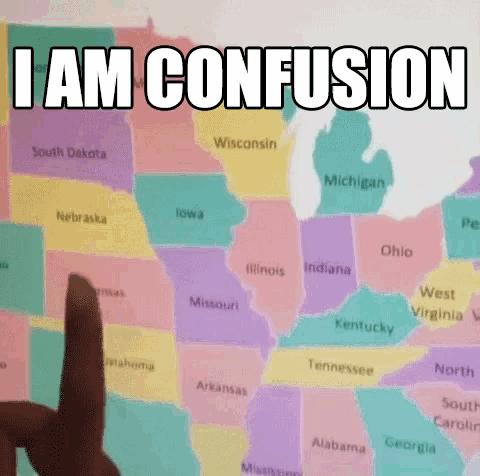
170 notes
·
View notes
Text
Reasons to believe that Bobby is dead:
the show made a point of reminding the audience that the virus Bobby contracted had no treatment.
the super-strain of the virus only had two doses of antiviral made to counter it, and we as the audience were told it would take weeks to make another.
we just sat and watched as Chimney very nearly died of the exact same virus. if Hen hadn't thought of flooding Chim's nasal cavity with water, we would have watched him bleed to death.
Bobby's remains were held, because he died in an act of biochemical terrorism. his body was most likely stored in quarantine, while they ran tests to ensure that the virus behaved and died like it should, since this was a modified strain. there would've also likely been a variety of tests to try and reverse-engineer the virus as well.
Athena's case. it was never about paralleling Bobby and Micah (the baby). it was paralleling Leah (the mother) and Athena, their incapability to accept the truth in the moment, their grief and the way their actions - or inaction, in Athena's case - were harming those close to them. that's why the case wraps with Athena finding and presenting concrete proof that Cameron (the little boy Leah tried to abduct) was not her son. if it had been a Bobby/Micah parallel, it would've been revealed that Cameron was Micah, that Leah had been right all along, but it wasn't. the writers might've taken inspiration from a real life case for this arc, but it was never going to pan out the way it did in reality. what would be the point?
Bobby's death was foreshadowed, a lot. Bobby's story was always going to end in death. it was the first thing we learned about him once he opened up. and yes, his priorities changed over time, but Bobby Nash has walked hand in hand with Death his entire life. there was no other way for his story to end. he gave his life to save his team. that is who Bobby has always been.
we didn't see a body, because the corpse of a person who has bled to death is not something that people typically want to see, especially to a character who embodied life as much as Bobby Nash. that was a kindness. it's the same reason we didn't have to sit through another 40 minutes watching him slowly bleed out and his organs shut down like we just saw with Chim. if you want 'realism', go watch a murder documentary.
his funeral. a ceremony like that, a procession that big, would've taken government approval, at the very least on a local level. there would've been mountains of red tape and paperwork and licenses and contingencies in place for a funeral of that size. if the government was really covering up something shady, do you really think they would've allowed that? bringing that much attention to the circumstances of Bobby's death?
bringing Bobby home. if that casket had been empty, it would've been mentioned. if Bobby was somehow alive inside the casket, it would've been noticed. sedatives remain in the system for about 24 hours, but that's not how long it keeps you unconscious for. metabolism also plays a part in how quickly the drugs wear off. if you look at the time it would've taken to prepare the casket and place Bobby inside, plus the duration of the service, the procession, the transport to the plane (with any precautionary checks done before boarding), the plane ride itself, transport to the cemetery in Minnesota, preparation for burial (which would likely include another check of the casket to make sure that it hadn't been damaged in transit), plus the graveside funeral and burial? Bobby would've woken long before he was buried. it would've been noticed. not to mention, Bobby was buried roughly three weeks after he died. that's not an abnormal amount of time. there is a LOT of paperwork that goes into handling and processing remains, especially remains that were infected with a major virus. I'm actually surprised it only took two weeks for his body to be released.
lastly, a few questions to think about, if this hasn't convinced you: what point would it serve, narratively, for Bobby's death to be fake? who would benefit from that arc? what would be the purpose of that arc? remember that we are talking about a TV show, not a real person, so in that vein, how would faking Bobby Nash's death impact the plot of this first responder procedural show?
#911 abc#911 spoilers#i really really want yall to THINK about this#bobby nash#i am trying my best here to be as civil as I possibly can be#i dont want discourse here i want you to THINK
72 notes
·
View notes
Text
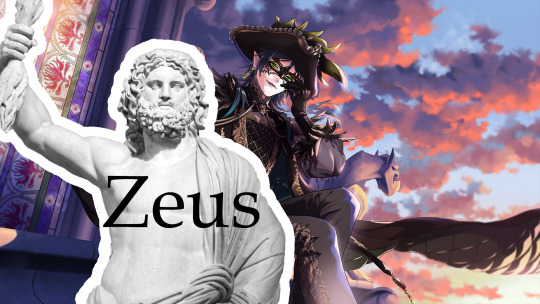
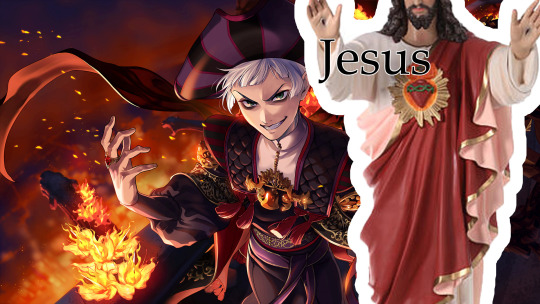
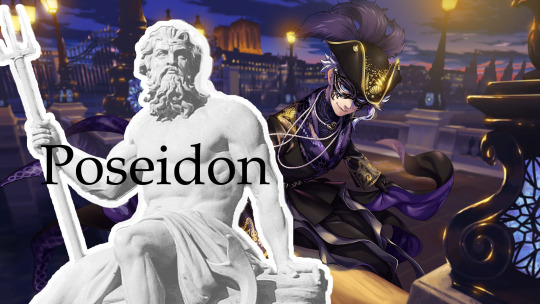
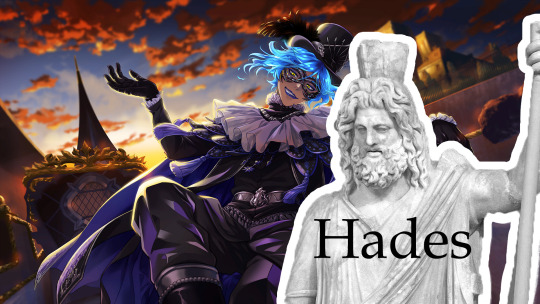
Nobody: Me at 3 AM: Glorious Masquerade represents the confrontation between polytheistic and monotheistic worldviews
Or "The Big Three of Olympus vs One Christian God" in the Glorious Masquerade event
Content Warning: Greek Mythology, religion, Christianity, Glorious Masquerade event spoilers
Note: I talk about things in this post from a researcher's point of view, in a descriptive and comparative manner mostly. Just some observations.
I've already discussed a similar concept before - Idia, Jade, and Sebek representing Hades, Poseidon, and Zeus, the "Big Three" in Greek mythology, the most powerful and important gods of Olympus - during the Harveston event. See the post here.
However, in the Glorious Masquerade, the situation becomes even more peculiar because the SSR characters are dorm leaders - those who are in charge. And then there's Rollo, who is twisted from Frollo.
Note: I will consider all sources of inspiration for Rollo, including the book and the musical, which were confirmed by Yana herself to be inspirations for Rollo.
What? Why? Who?
3 vs 1. The Big Three of Greek Pantheon vs The One God, who embodies 3 in 1 - the Father, the Son and the Spirit.
The Big Three are the three most powerful gods among the Olympians - Zeus, Poseidon and Hades.
Zeus commands the sky, lightning, kingship and summon any weather conditions.
Poseidon manipulates water, storms and earthquakes.
Hades has dominion over the dead and undead, darkness, earth-related disasters, and metals and jewels.
*By the way, lightning was considered just Zeus throwing a temper tantrum, and what happened when Malleus got angry? Right, he started throwing lightnings left and right.
And now we have Rollo. Twisted from Frollo, who, as we know was a religious man (especially in the book where he is a priest, not a minister).
And despite there being other characters, such as vice-president and the assistant, they aren't "real" or “important” characters like Rollo.
So we can say there is only one (1) main character in this event.
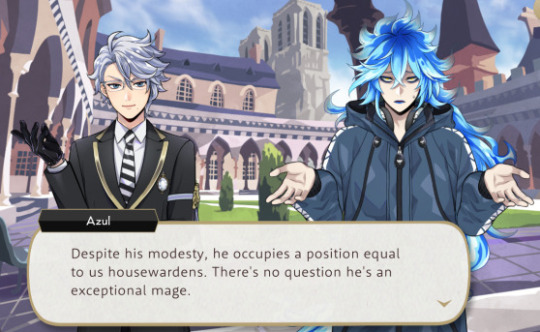
2. 7 Dorm Leaders vs 1 Head of the Council
As is well known, Ancient Greek mythology features many major gods, each controlling different aspects of life (or representing them, or serving as patrons). This makes Ancient Greek religion a polytheistic system - meaning it has multiple gods - akin to the Great Seven and the dorm system at NRC.
The Dorm Leader Council functions much like a small pantheon. Not to mention NRC is located on upper hills, which resembles a mountain (Olympus) if we look at the landscape of the Sage Island.
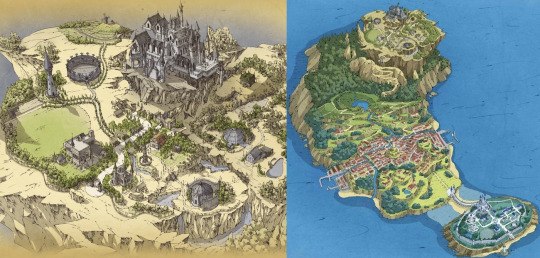
On the other hand, Christianity only has one God, making it monotheistic religion. There are multiple saints in Christianity, who are patrons of different aspects of life, however it is important to note that these saints do not control - they are more like the intercessors between man and God.
Even the NBC itself is focused on one Villain and has one statue in the yard, not the 7 (the "pantheon" of NRC). And NBC itself doesn't have Dorm system like NRC.
3. Oral vs Written
Greek religious tradition is primarily oral, with legends and stories passed down through generations by word of mouth.

In contrast, Christianity is predominantly a written religion, where the written canon holds great importance.
How is it important here?
Well, in this event specifically the NRC guys spend their time walking around and commenting on things. We learn some of their lore and thoughts on various topics through dialogue. Even Professor Trein reveals his past verbally telling about it. Naturally, it’s a game mechanism. But since we’re talking about such details….
On the other hand, the most important part of Rollo lore is found by the Big Three in written form - Rollo’s diary. It's also noted how Rollo prefers writing above all else. He writes in his diary, sends letters, and drafts invitations. While this may not apply to the NBC in general, since we're focusing on Rollo, this detail is worth considering as well.
4. Our guys vs That One
Another difference between the two religions is that the Greek gods had flaws that made them more similar to humans. They had tempers and they often held grudges. This made the followers of the religion not want to be like them but, instead learn from them and their shortcomings, frequently through fear.
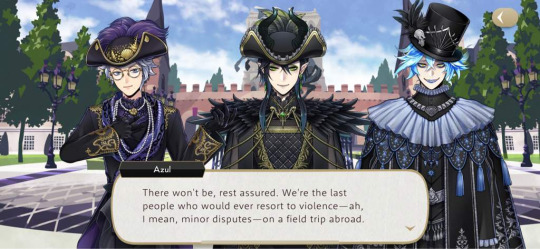
In contrast to the flawed gods of Greek mythology, Jesus is portrayed as a man who is to be aspired to, more so than the Greek portrayal of a god; who the audience learns from (imitating in a way), rather than obeys.

Our NRC boys are someone we know and who we’re familiar with. We know their struggles and fears, their dark past. Even the guys in charge of each dorm - the Dorm Leaders - are not so distant from the regular students. Well, more of less.
Whereas Rollo is described by all the characters we’ve met at NBC (and even from his vignette) as someone who is amazing, excellent, wonderful and so…exemplementry. Rollo, at the same time, distances himself from everyone.
5. Vertical vs Horizontal
A small but interesting observation is that many monotheistic religions, including Christianity, often have a “vertical mindset” - symbolizing a relationship between the human and God.
In Christian cosmology, we often imagine a vertical world structure: Hell at the bottom, the human realm in the middle, and Heaven above.
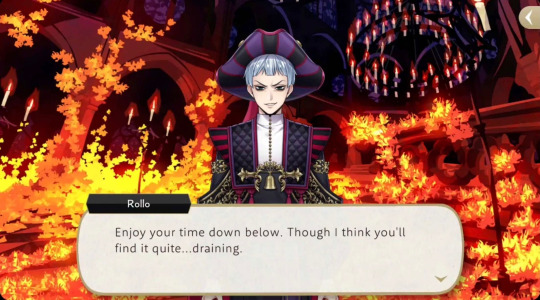
In this event, we also experience vertical movement when things get serious. Initially, when it's peaceful and fun, we mostly walk around the town (mostly horizontal, not including the lower parts).
However, when the action begins, Rollo first sends us downward into the sewers. From there, we start moving upward. The ascent of the tower is highly symbolic, as we are literally ascending towards the sky where Rollo awaits us (with his “judgment”)
6. Masks
The whole masquerade theme is, of course, a nod to the cartoon and part of the game feature to get the characters to dress up.
But let’s remember that in Ancient Greece, masks played a significant role in theater, particularly in tragedies and comedies (twst features elements of both). In general, it is known that masks represent hidden nature, transformation, and more.

Interestingly, only our NRC squad wears masks and costumes. We even encountered some Royal Sword Academy students, but they were not given costumes (again, a game feature, but still noteworthy).
On the other hand, there's Rollo, who isn't wearing a mask or even a costume. He doesn’t need to. He is who he is, with no need to transform into something else, as he represents the One, in our comparison here.
What's even more interesting is that, despite not wearing a physical mask, Rollo is the one with ulterior motives in this event, and we only learn his true face later on. He metaphorically takes the mask off, even though he never wore one in the literal sense.
7. Catholic Guilt
The last but not least - Rollo's punishment, which, perhaps is the most fitting and cruel outcome for him. Rollo, after being defeated, expects harsh punishment because he is ruthless with himself and assumes others will treat him the same way. He failed and he expects to be punished. However our Big Three surprise him by concealing the truth and allowing others (the NBC mobs were the first to thank him for his bravery at the tower) to believe that Rollo was a hero. This situation forces Rollo into a state of internal torment, where he must live with the guilt of his actions while being praised for something he didn't truly do.
Rollo's punishment is psychological, forcing him to confront his guilt and shame in isolation. They choose leave him one on one with his Sin.
On the contrast, in Ancient Greek mythology punishments were often cruel and involved physical pain. One of the most popular example would be of course the myth about Prometheus, which, by the way involved Zeus.
And the way Big Three dealt with Rollo was truly cruel in its own way.


(from an interesting article about Greek Gods and punishment - here)
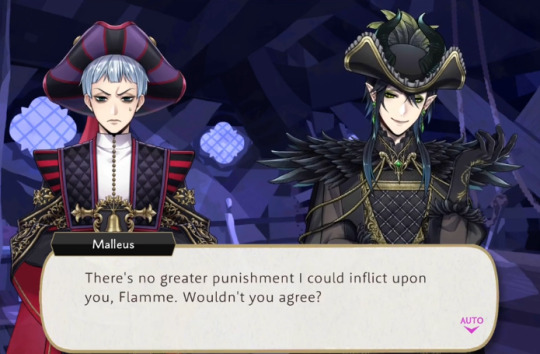
Fin
I left out some obvious notes like Malleus having horns, Rollo hating on magic etc.
Naturally, there may be other details I haven’t mentioned, so feel free to add any additional insights!
#the semester has just started but I'm already in the mood#was fighting the urge to add Comedia dell'Arte masks here#twisted wonderland#twst analysis#glorious masquerade#disney twisted wonderland#rollo flamme#malleus draconia#idia shroud#azul ashengrotto#twst spoilers#tw religion
251 notes
·
View notes
Text
Canonicals Tournament FINAL
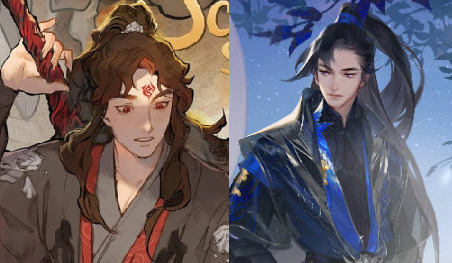
The final is between Luo Binghe from The Scum Villain's Self-Saving System (shizun: Shen Qingqiu) and Mo Ran from The Dumb Husky and His White Cat Shizun (shizun: Chu Wanning)
Propaganda under the cut! (Warning: Propaganda may include spoilers about the characters and their media)
Luo Binghe:
Luo Binghe's shizun Shen Qingqiu caused his sexual awakening and they lived together with Luo Binghe acting similar to a housewife.
Even after being betayed, stabbed, and pushed into the Endless Abyss, Luo Binghe still loved Shen Qingqiu and wanted answers instead of revenge. Instead he had to repeatedly suffer his shizun dying in his arms and assumed abandonment. Which makes him absolutely lose it, made even worse by his evil sword Xin Mo which worsens all of his negative emotions and destroys its hosts, along with additional trauma over the course of the story.
He reused the sword that his shizun sacrificed himself to free him from, cuddles the corpse every night for five years to preserve it, he creates dreams of their happy years together but never made a Shen Qingqiu that would speak to him, he kidnapped and destroyed cultivators' cores so he could feed xin mo and preserve sqq's corpse, he rebuilds their house in his demonic palace, he spent years fixing sqq's destroyed cultivation and trying to revive him, he forces Shen Qingqiu live in that new house, he rescues and repeatedly puts himself in harms way to protect sqq, he tries to destroy the world so Shen Qingqiu can only love him (due to being driven mad by Xin Mo and his believed abandonment by sqq). He tries to kill himself after Shen Qingqiu dies for him again. He would do absolutely ANYTHING for Shen Qingqiu! He's increadibly jealous of everyone Shen Qingqiu gives attention to, including stairsweeps he smiles at. Luo Binghe has sooo much wrong with him and it makes him so lovable. He's so incredibly traumatized, driven by love and desperation for a majority of the story. He loves Shen Qingqiu so much and can't bear to live without him.
After everything? He lets Shen Qingqiu go, wanting him to be happy even if it means sqq won't stay with him. But sqq wanted to stay together! He gets his man! There is in world porn written about them, they have weird kinky sex inspired by the porn, they get married! Luo Binghe cries regularly for sqq, so sqq can dote on him despite his thin face. Luo Binghe is shameless and adores sqq. Lbh got so nervous that he fell flat on his face when proposing! Lbh loves sqq so much and wants him to be happy more than anything else!
More on disciple era:
Luo Binghe's sexual awakening was his shizun tied up and shirtless. He fell in love after Shen Qingqiu got poisoned protecting him. He moved into his shizun's house and handled all of the cooking and cleaning, would regularly fake fall into Shen Qingqiu during training to get hugs. He got a boner from being forcibly cuddled to heal his injuries. And ran to jump into a lake after being spanked for struggling too much during the forced cuddling. Sqq still never noticed lbh's affections.
--
It took him like 3(three) interactions with nice shizun (transmigrator who replaced his old one) to fall irrevocably in love. baby boy was ready he had mommy issues daddy issues and honestly by that time shizun issues too... luckily his new shizun can fill all those roles and more!
#lbh is THE shizunfucker
#binghe calling him shizun is a kink at some point its definitely him
#vote binghe!!#he wanted to fuck shizun so much that shizun died twice for him
#... i mean. luo binghe is a satire of the shizun fuckers character trope. hes an exageration of it so hes Very It
#luo binghe#again its basically a kink for him as well that puts it on another level
#cmon man#binghe is THE shizun fucker#activily has to be told to not call his husband shizun during sex
#binghe is THE shizunfucker supreme. no competition.
Mo Ran:
*gestures helplessly at the whole damn book*
#Mo 'I died and went into the past after the teacher I hated died in my arms and I dream of him every night' Ran???#of course its him
#vote for Mo ran I’m sorry but he is the emperor shizunfucker of all the shizunfuckers#he is the man the myth the legend#he’s the one you think of immediately when someone says shizunfucker
Extra Propaganda here. There are 3 versions of Mo Ran throughout Erha and every single one of them either wants to or did fuck their Shizun. Even in the darkest timeline when he thought he hated CWN more than anyone he fucked him. This boy is obsessed.
#mo ran 100%#he truly has the shizunfucker mentality
#mo ran#HAS TO WIN#he wants to fuck his Shizun so bad
#but it's gotta be mo ran#the all-time shizunfucker in this world that world and beyond
#luo binghe#mo ran#the scum villain's self saving system#svsss#the dumb husky and his white cat shizun#2ha#shen qingqiu#chu wanning#bingqiu#ranwan
566 notes
·
View notes
Note
Dogman, how do you write SO WELL!?!? I love all your characters and I need to know what/where you find inspo from...
Ha. Every writer is just someone who apes the creative processes of their inspirations. For video game writing specifically, there's two answers for me.
Toby Fox is always gonna be a huge inspiration for me. I've written plots and characters before and had to abandon ideas after realizing I'd accidentally written part of UT again. Even some of the ideas I used were undeniably inspired by UT in a subconscious way and ofc, I included several explicit references to UT in my last series. Toby's a very clever guy who likely pays very close attention to the art he consumes and tries to figure out how to maximize how much his work connects with his audience. Whatever his process is, it works.
The other answer is a lil funnier: Scott Cawthon, but specifically the legend, not the man. For context: Back in the earlier days of the FNaF fandom, people had a hyper-inflated view of Scott Cawthon's writing skills that largely came from how little of a presence he had back in those days. In the vacuum of Scott actually explaining his own process in detail, people got caught up in his genuinely creative way of hiding exposition in his games using cryptid and (then) unexpected methods, and a narrative formed (one that he's since refuted.)
While he never implied it tmk, fans broadly believed that he constructed these sweeping and complex narratives with tons of cohesive moving parts, with the games essentially acting like the mere tip of his lore iceberg. People even thought he wrote so much that he had whole games worth of lore outlined from the beginning! In the first Dawko interview he gave, he clarified that this wasn't the case and explained roughly what his process was (basically just outlining rough theme ideas + aesthetics for future titles.)
However, that legend made younger-me's mind run wild and any time I wrote a story, it became very difficult for me to not keep writing down ideas while completing the grunt work that followed me finishing my scripts. When I finished DSaF 1, I already had DSaF 2's draft written and by the time 2 was done, I had enough lore for a 3rd game on paper (and a lot more stuff that I didn't use.) By the time three was out, I had pages upon pages of unused concepts/story ideas and more or less just had to decide to call it quits or else I'd be pumping out entries forever!
That's why if you go back to those older games, there's references that directly refer to future plot-points in pretty casual/easy to miss ways. (Like Henry's mention in DSaF 1, Dave being heartless in DSaF 2, Jack being soulless in 1, and even Blackjack being Jack's soul in 2. Most of 3's major plotpoints are implied somewhere in 2 and some of 2's in 1.)
DT is much the same. By the time I finished writing it, I had fairly detailed drafts for arcs for each of the characters, some early material ended up getting completely recontextualized (and even modified in small ways to not conflict with the wider ideas I came up with.)
I get really into writing my stories/characters and I always wonder exactly how things ended up where they are, what characters think about but don't say, etc etc. This is why I have an obscene amount of Crown lore that I have very little to do with rn (since he impacted the whole world so deeply.)
This extra stuff also includes plenty of sequel material ideas, though I didn't think I'd even get a chance to use them since DT performed pretty meagerly before the big release and I was expecting to have to move onto something new. Though it turned out that Scott didn't actually write his games this way (by his own admission), it's the correct answer for what my core writing inspiration for writing game narratives is.
Hope this helps!
190 notes
·
View notes
Text
Writing Notes: Story Plot
Plot - is what happens in a story.
Every story is made up of both events and characters.
A story happens because a pattern is interrupted.
If you are writing about a day that is like any other day, it is most likely a routine, not a story.
A Strong Plot
Centered on one moment—an interruption of a pattern, a turning point, or an action—that raises a dramatic question, which must be answered throughout the course of the story. This is also known as plot A.
Every element of the plot—each scene, each line—exists in service of answering that question. There are myriad plot devices that can bolster the main story; these are considered subplots.
7 Types of Plots
The nature of the dramatic question informs the plot and what kind of story it will be. Are the characters threatened by something external or internal? What genre will the story be?
Tragedy
Your main character should undergo a major change of fortune — almost always from good to bad, happy to sad.
Tragic characters have to suffer.
Comedy
Even though your characters have defects, their defects should never wind up being painful or destructive.
Comic characters make it through unscathed.
Hero’s Journey
The hero of a story must undergo two things:
Recognition and reversal of a situation.
Something has to happen from the outside that inspires the hero in a way that he/she didn’t realize before.
Then he has to undertake a quest to solve the situation.
Rags to Riches
Remember Cinderella? The classic fairy tale follows a simple rags-to-riches plot:
the protagonist is downtrodden, impoverished, or otherwise struggling, and through a series of events—either magical, like in Cinderella, or more realistic, like in Great Expectations — achieves success.
This type of plot often features a happy ending.
Rebirth
The rebirth style of plot follows a character’s transformation from bad to good.
The character will frequently have a tragic past that informs their current negative view of life, however, a series of events (usually set in motion by the protagonist or a narrator) will help them see the light.
See: Scrooge in A Christmas Carol, or the Beast in Beauty and the Beast.
Overcoming the Monster
Otherwise known as the good versus evil plot, this type of story features a protagonist (good) fighting an antagonist (evil).
The protagonist can be a singular character or a group united in their mission.
The antagonist is generally a big, bad evil (like Darth Vader in Star Wars) who continuously throws obstacles in the protagonist’s way—until the final battle.
Voyage & Return
This plot is a simple point A to point B and back to point A plot.
The protagonist sets off on a journey, only to return to his or her starting point having gained wisdom and experience (and sometimes treasure too).
Paulo Coelho's The Alchemist is a beloved contemporary illustration of this plot.
How to Outline a Story Plot: Three-Act Structure
Beginning
The beginning of your novel has to accomplish a lot.
It must introduce the hero, the villain, and the world of the story, as well as the story’s dramatic question, and it must do this with enough energy to grab your reader’s interest right away.
A prologue can be useful for seizing the reader’s attention.
Middle
Your job during the middle of the story is to make the hero’s quest as difficult as possible so that at every moment it seems less likely that the hero will triumph.
You must raise the stakes along the way and create obstacles of ever-increasing intensity while keeping your eye firmly fixed on your conclusion.
The different plot points can include the basic plot, plus various subplots.
The main plot of a story always has to build up to the resolution.
End
The end of your story answers the dramatic question, which already has your ending hidden within it.
For example, if your question is:
Will Ahab catch the whale?
Then your story’s finale will be the moment when he does.
Often, tension evaporates in the middle of a novel, so it’s a good idea to write your ending first. It may not be perfect, and you can always change it later, but it’s useful to know the climax to which your characters are headed.
Having that destination will help you stay focused during the “middle muddle.”

Freytag’s Pyramid
German novelist Gustav Freytag expanded on Aristotle’s concept of plot by adding 2 additional components to the beginning, middle, and end:
Rising action and falling action.
Freytag’s dramatic arc, also known as Freytag’s Pyramid, includes the following:
Exposition. This is the beginning of the story.
Rising action. Once the story has begun, it is important to create tension by raising the stakes. You must raise the stakes along the way and create obstacles of ever-increasing intensity while keeping your eye firmly fixed on your conclusion.
Climax (middle). The pinnacle of your plot.
Falling action. The falling action occurs after the climax but before the end. Falling action frequently depicts the protagonist dealing with the consequences or fallout of the climax. The falling action is when the protagonist ties up loose ends and heads toward the conclusion. It is also referred to as the denouement.
Resolution. This is the end of the story.
Source ⚜ The 3-Act Structure: History & Elements ⚜ A Guide More References: Plot ⚜ Character ⚜ Worldbuilding ⚜ Writing Notes
#plot#on writing#writing tips#writing advice#writeblr#dark academia#spilled ink#writing reference#writing inspiration#creative writing#fiction#writing ideas#literature#writers on tumblr#poets on tumblr#writing prompt#poetry#light academia#writing resources
297 notes
·
View notes
Text
The Circle of Arceus Doesn't Need Modern Legendaries
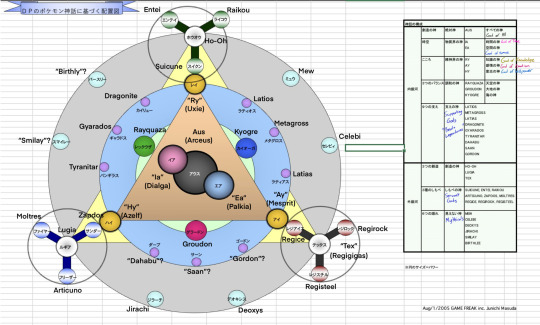
(Source: Centro Leaks)
That's right, it's time for me to post a theory about this.
A lot of people are pointing out that this diagram is obsolete simply because there's been five more regions of legendaries since it was made and it's been...almost 20 years. I think that's only partly true. It actually holds up surprisingly well in modern Pokemon.
GameFreak definitely tried to get away from the whole "legendaries are gods" thing after Gen IV, mostly because where do you go after Arceus? So you don't get a lot of newer legendaries involved in the creation of the Pokemon world.
Plus, GameFreak used to have these random moments where they worried about continuity. Why do we need incense to evolve the Baby Pokemon from Sinnoh? You think players are going to complain that Munchlax should've hatched in Johto? Well, you might be right...but still.
That might be why a lot of newer legendaries have an alibi that explains why they weren't in the Pokemon World when it was created. Many of them were either in Space, or "Ultra" Space:
The Orignal Dragon of Unova
The Cosmog Line
Necrozma
Eternatus
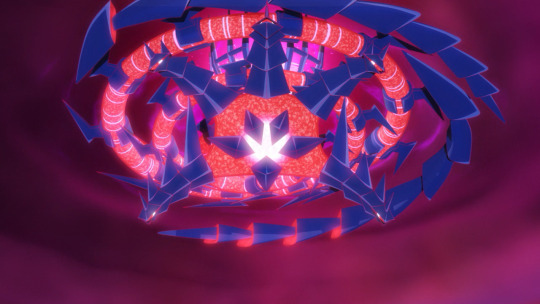
By the way, some professor really should look into the reason so many incredibly dangerous space dragons are just dropping into the Pokemon world.
Then there's legendaries that are strong in the context of their story, and some are even worshiped, but they're more like regional gods and myths.
The Swords of Justice
The Tapus
The Legendary Heroes
Kubfu Line
Calyrex and His Steeds
The Paradox Duo
The Treasures of Ruin
Ogerpon
Most modern mythicals unfortunately fall hard into this category, to the point that some are literally just a monkey, Zarude. Actually, there's no need to list the others. You get the idea.
But who does fit the circle?
That leaves the Aura Trio, the Forces of Nature, and...Terapagos. In my opinion, these legendaries would be right at home in the circle. The Aura Trio deals in life and death, which is pretty major.

That Yggdrasil inspiration would make the Aura Trio right at home on the tree of life from the beta origin story. You know, that "giant tree of life" that Rayquaza, Groudon, and Kyogre broke apart, that turned into the sky, earth, and ocean?
The three gathered in a circle and prayed, and the seed sprouted. The sprout quickly grew, and became the giant tree of life. However, the tree continued to grow, soon filling the entire world, and no one was able to move.
(...) RAYQUAZA wrapped its body around the tree of life. GROUDON and KYOGRE slammed their bodies into the tree of life. Eventually, the tree fell and broke into three pieces.
REI, AI, and HAI prayed, saddened that the tree would rot away like this. Then, the pieces of the broken tree would transform into the sky, earth, and ocean. RAYQUAZA became the pillar that holds the sky.
(Source: Centro Leaks)
Yeah, now I'm thinking the Aura Trio are more of a second try at this whole tree of life thing at GameFreak. Because the whole "Rayquaza wrapped its body around the tree" gives me major Yggdrasil vibes. Surprise Pokemon theorists, Nidhogg isn't Zygarde...it's Rayquaza!
Rayquaza did Ragnarok!
But some people think the Aura Trio are aliens who came to earth on the meteor that the Anistar City Moondial was made from, so that would explain why the Aura Trio aren't in the circle. After all, the Unovan Original Dragon came from a meteor just one generation earlier.
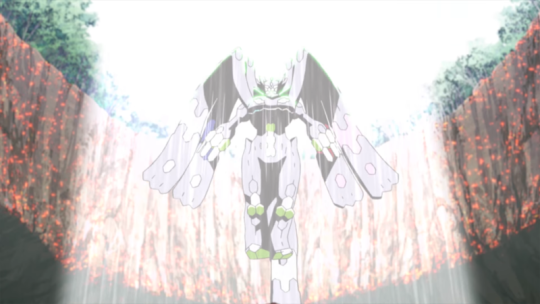
There's also the alleged "original story" rumor for XY that claimed that XY was originally about aliens. The Teraleak probably has something to say about that. So the jury's out about the Aura Trio - they could belong in the circle, but they might be aliens.
(Wait, the rumor was that the alien plot was cut for time? As in, it would have been included (and maybe made less "weird") if they didn't rush? So is THAT was what in Southern Kalos...)
Or maybe my theory is wrong. Deoxys is on the outer layer of the circle after all. Maybe Arceus doesn't discriminate against aliens, they just have to stay on the outer layer. It's not that much of a difference either way - there's plenty of room on the outer layer with the other mythicals. I'm talking about the head honchos really.
The Forces of Nature probably belong on the circle, if we're being honest. They kind of clash with the Legendary Birds' role in the mythos as "weather" gods, but they should be on there.
Lastly...Terapagos is an enigma when it comes to this whole post. It might be more powerful than Eternatus, since "tera" is more power than "giga", right? It's so much power it can literally warp a Pokemon's type. Like Arceus, or genetic engineering.
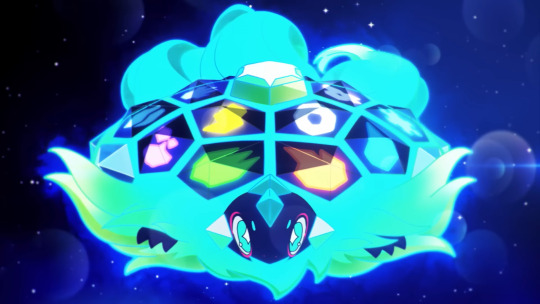
And Terapagos isn't an alien like Eternatus, at least there's no evidence of it. It's been stuck underground, but it used to live on land. I would say it's just a really, really powerful Pokemon that isn't technically godly, but it's literally based on the World Turtle, another creation myth.
It's in the same boat as the Aura Trio, only it's not an alien. Except, it is responsible for the "Stellar" type, as in stars. And there is this Pokedex entry:
An old expedition journal describes the sight of this Pokémon buried in the depths of the earth as resembling a planet floating in space.
Who says that planet is Earth? What if that's its homeworld?
Terapagos doesn't just borrow inspiration from the world, but the idea of worlds itself, or the philosophical idea of "turtles all the way down". Not only does it depict a world, but a world on a world. A world on a world on a -
I don't know how to end this. Are all my Teraleak theories going to be this long? I hope not. Happy Teraleak! Enjoy the leak!
---
Edit: Changed the name of the title. It used to be called "Newer Legendaries Just Aren't in Arceus' Personal Circle".
All pics other than the Arceus circle are from Bulbapedia. It's easier that way.
#Pokemon#teraleak#gamefreak#legendary Pokemon#legendaries#Arceus#arceus circle#Pokebible#Origin of the Pokemon World#Zygarde#Terapagos#GameFreak leak#gaming#video games#beta Pokemon#Pokemon theory#beta content#Pokemon teraleak#Pokemon beta content
114 notes
·
View notes
Text
Useless Heroes and Hori's spinelessness with setup.
Salutations! I remembered my password.
(Jk, I've been busy)
It's no secret that Japan's heroes in MHA are extremely incompetent, I've pointed out their general disregard towards human life and surrounding infrastructure.
However what some of you might not know is that a majority of heroes in MHA are completely and utterly useless.
And I'm not just talking from a Doylist perspective either, Heroes in MHA are more of an obstacle than the villains they fight.
Take this panel for example:
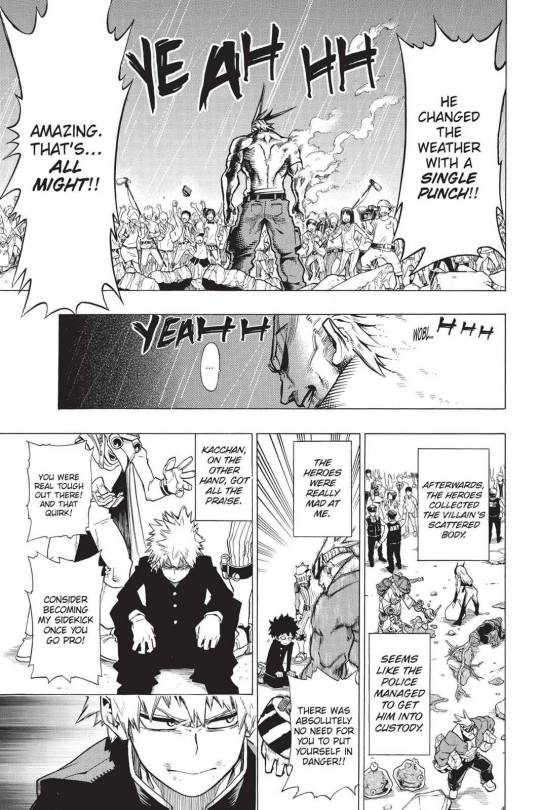
Originally I was going to crop this to only include (ugh) Birdman, however on a second read I realized how asinine every single hero (not counting All Might) is.
First off the "clean up". I shouldn't need to explain what's wrong with this. The crowd posing a security risk, the minimal security. The fucking plastic bags!?
I mean really, what the hell can Backdraft achieve here, or Kanami or Mount Lady. The list goes on.
(That also ignores how these 4 imbeciles are getting paid for what a clean up crew or police force could do easily. Not to mention this whole incident veing their fault)
Anywho... We then see Death Arms and another "hero" yelling at Midoriya, who was also a victim of the Sludge Villain and actually bought All Might time. Whereas Bakugo failed like a panicked animal and worsened the situation.
It is here we see the first plot point: Heroes are hypocritical and biased towards those with flashy quirks.
They automatically downplay Midoriya while also neglecting to get him checked on by a paramedic.
Even Bakugo doesn't benefit as these so called Heroes swarm him like a vulture. Just so they can use him to boost their own popularity.
(and if I'm honestly speaking, if Birdman were somehow a high ranker. Bakugo would have fallen for it hook, line and sinker)
This subtly introduces a second idea: that Heroes are not as pure as they seem. Perhaps they can even be corrupt.
These two ideas, plotpoints, call them what you will. Do a good job at showing us the cracks in the mirage. Cracks that seemed to be widening come the Sports Festival.
So what happend?
I'm sure we're all familiar with the utter disappointment/disaster that was MHA's epilogue.
Regardless if you believe the initial final chapter to be canonical or the more recent 'improvement'. We can all agree that it bombed in regards to doing the above any justice.
The simple answer is that Hori (in my opinion) is a spineless hack, who can draw really good but for the love of god. Keep him out of the Writers room.
Hori seems to whine about how dissatisfied he is with MHA's direction towards darker themes or even complaining about characters he wrote into the story himself (see Tetsutesu x2.)
Hori lacks any guts when it comes to his own writing, preferring to laze-about in what's comfortable. The problem is he didn't write a comfortable story.
Corruption, Eugenics, Peer Abuse, Negligence and Human Trafficking. These are all things that MHA brings up but Hori refuses to touch on. Despite having wrote them into the world (and plot) himself.
Someone once commented under a post of mine that my W.I.P worked as a story because the events fit, rather than simply existing for shock value.
Now I cannot confirm whether or not the above were added to drive up stakes. However with how MHA ended up, I wouldn't be surprised if it was like the Big Three all over again. Hori adding something, nor knowing what to do with it and then desperately trying to smother it while introducing the "next big thing".
Ultimately, I find it humorous that someone so inspired by comic books and Star wars, is such a coward when it comes to pushing boundaries. Instead choosing to fall in line with what's trending, what the polls say, chasing after something that could never be obtained in the first place.
But hey look at the bright side, at least we have fan-works.
#bnha critical#mha meta#anti bakugou katsuki#anti bakugo katsuki#anti hero society's#hero society critical#Apologies for the short post and absence.#Thr0wnawayyy
118 notes
·
View notes